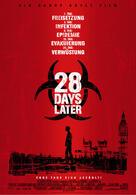28 Days Later: Impact on the Horror Genre

Introduction
The 2002 film 28 Days Later, directed by Danny Boyle and written by Alex Garland, is widely regarded as a cornerstone of modern horror cinema. Not only did it rejuvenate the zombie genre, but it also introduced a fresh narrative approach by combining social commentary with visceral storytelling. As the world grapples with various crises, the themes explored in this film continue to resonate with audiences, making it a relevant subject to revisit.
The Premise of 28 Days Later
The film is set in a post-apocalyptic London, following a virus outbreak that turns people into rage-fuelled zombies. It begins with animal rights activists releasing a subject from a laboratory, inadvertently unleashing a deadly pathogen. The protagonist, Jim, awakens from a coma 28 days after the outbreak commences, and the film documents his harrowing journey through a devastated and chaotic London.
Cinematic Techniques and Themes
28 Days Later is renowned for its innovative use of filming techniques. Shot on digital video, it offered a raw and gritty aesthetic that heightened the film’s tension and realism. Boyle’s direction, combined with Garland’s screenplay, not only propelled the narrative forward but also evoked strong emotional responses by humanising the characters amidst extreme circumstances.
Social Commentary
Beyond the horror elements, the film is rich with social commentary. It addresses themes such as the fragility of society, consumerism, and isolation. As the characters navigate through the survival of the fittest mentality, viewers are prompted to reflect on societal structures in their own lives. The film’s implications about the breakdown of social order in times of crisis feel especially pertinent in today’s uncertain world.
Enduring Influence and Legacy
28 Days Later became a commercial success and significantly influenced subsequent films within the horror and thriller domains. Its impact can be seen in the resurgence of zombie films and the popularity of post-apocalyptic narratives, as exemplified by series such as The Walking Dead and films like World War Z. Moreover, it sparked discussions in filmmaking circles regarding the blending of genre elements with thought-provoking themes.
Conclusion
As we look back on the legacy of 28 Days Later, it is clear that its impact goes beyond mere entertainment. It serves as a reflection on humanity’s deepest fears and societal vulnerabilities. The film’s commentary remains significant as ongoing global challenges continue to unfold. This landmark film not only revolutionised the horror genre but also encouraged audiences to contemplate the complexities of society in times of crisis.
